1. What is the Oil Tanker Trailer Called in Senegal?
2. What material is Fuel Tanker Truck Trailer in Senegal?
3. How to Drive a Fuel Tanker Trailer in Senegal?
In the West African nation of Senegal, the transportation of petroleum products is an essential aspect of the country's economic infrastructure. These products power industries, fuel vehicles, and provide energy to homes and businesses. To facilitate the efficient and safe movement of these valuable resources, a specific type of vehicle plays a crucial role: the "Citerne" trailer.
Understanding the Citerne Trailer
In Senegal, the term "Citerne" refers to an oil tanker trailer used for transporting various types of liquid petroleum products. These products include gasoline, diesel, kerosene, and other refined oils. The Citerne trailer is designed to securely transport large quantities of liquids from refineries, depots, or distribution points to various destinations across the country.
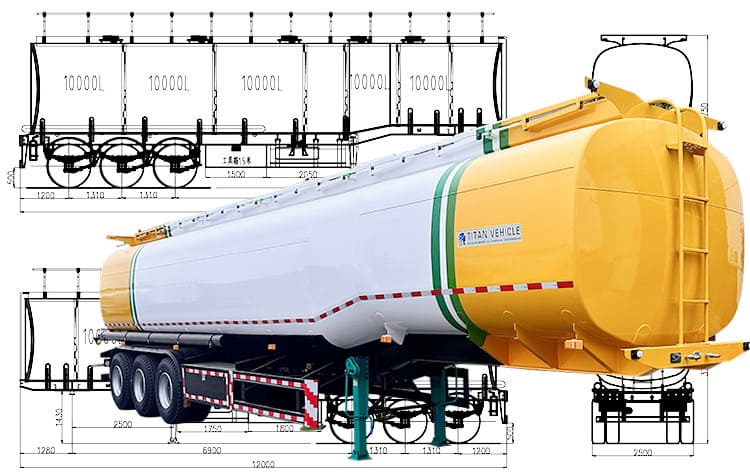
What is the Oil Tanker Trailer Called in Senegal?
Key Features of Citerne Trailers
1. Capacity: Citerne trailers come in various sizes and capacities, accommodating different volumes of petroleum products. These trailers can hold thousands of liters of liquid, ensuring a continuous and efficient supply to meet the nation's energy demands.
2. Safety Measures: Safety is paramount when dealing with flammable and hazardous materials. Citerne trailers are equipped with safety features such as reinforced structures, specialized valves, and emergency shut-off systems to prevent leaks, spills, and accidents during transportation.
3. Durability: Given the challenging road conditions and diverse terrains in Senegal, Citerne trailers are built to withstand rough roads and provide stability even on uneven surfaces. Sturdy construction ensures the protection of the cargo and the safety of both the driver and other road users.
4. Efficiency: Citerne trailers are designed for efficient loading and unloading processes. Quick and secure connections enable the transfer of petroleum products with minimal wastage and downtime, ensuring a continuous flow of energy resources.
5. Regulatory Compliance: Senegal, like many countries, has regulations and standards in place to ensure the safe transport of hazardous materials. Citerne trailers must adhere to these regulations, including proper labeling, safety equipment, and documentation.
6. Economic Significance: The smooth functioning of the Citerne trailer fleet is vital to Senegal's economy. A reliable supply of petroleum products supports industries, agriculture, transportation, and other sectors that contribute to the country's growth and development.
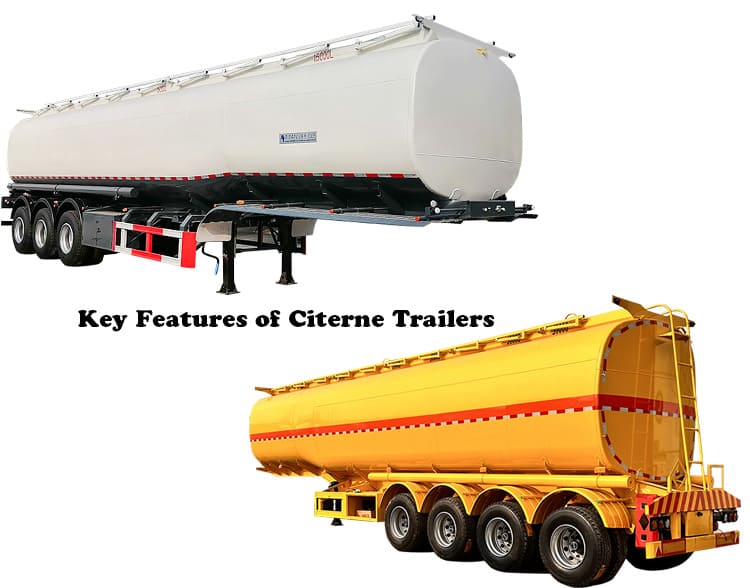
Key Features of Citerne Trailers in Senegal
Role in Senegal's Energy Landscape
The Citerne trailer plays an integral role in Senegal's energy landscape by facilitating the movement of petroleum products across the nation. These trailers connect refineries, storage facilities, and distribution centers to urban areas, remote communities, and industries. This network ensures that people have access to the energy resources they need for daily life and economic activities.
In a country where transportation infrastructure can vary widely, Citerne trailers bridge the gap between supply and demand, helping to maintain stability in energy distribution. Their reliable service ensures that businesses can operate smoothly, vehicles can stay on the move, and households can enjoy uninterrupted access to essential energy resources.
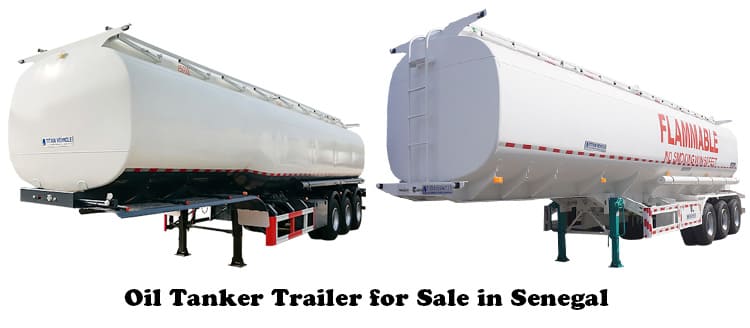
What is the Oil Tanker Trailer Called in Senegal?
In Senegal, the Citerne trailer is more than just a vehicle; it's a lifeline that ensures the availability of petroleum products throughout the nation. From urban centers to rural areas, these trailers enable the wheels of progress to keep turning. As Senegal continues to grow and develop, the Citerne trailer will remain a symbol of the nation's commitment to efficient energy distribution and economic advancement.
When it comes to transporting one of the most vital resources - fuel - the choice of materials for fuel tanker truck trailers is of paramount importance. In Senegal, where efficient fuel distribution is crucial for powering industries, vehicles, and homes, the selection of the right material determines not only the trailer's durability but also the safety of the cargo and the environment. Three main materials are commonly used for fuel tanker truck trailers: carbon steel, stainless steel, and aluminum steel. Each material has its own set of advantages and considerations, contributing to the diverse landscape of fuel transportation in Senegal.
Carbon steel is a strong and durable material that has been used in various industries for decades. In the context of fuel tanker truck trailers, carbon steel offers several benefits. It is relatively cost-effective, making it an attractive option for companies looking to balance performance with budget considerations.
Carbon steel also provides good structural integrity, which is crucial for containing the weight and pressure of liquid fuel during transportation. However, it's important to note that carbon steel is more susceptible to corrosion compared to stainless steel and aluminum steel. Regular maintenance and protective coatings are necessary to ensure the longevity and safety of carbon steel fuel tanker truck trailers.
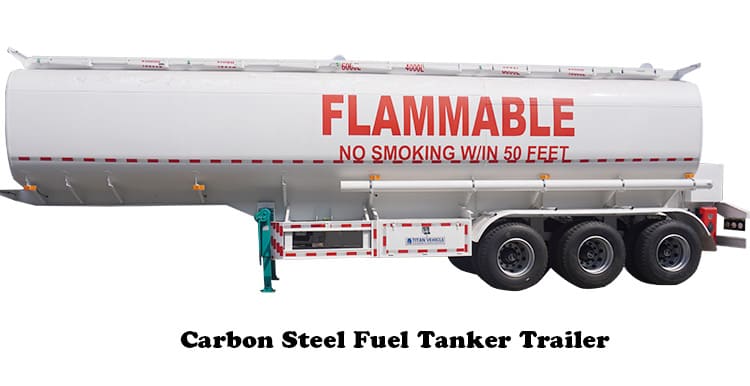
Carbon Steel fuel tanker trailer for Sale in Senegal
Stainless steel is renowned for its resistance to corrosion and rust. This makes it an excellent choice for fuel tanker truck trailers, particularly in regions like Senegal where exposure to moisture and harsh environmental conditions is common.
Stainless steel's corrosion-resistant properties minimize the risk of leaks or spills that could harm both the environment and human health. Additionally, stainless steel is hygienic and easy to clean, reducing the potential for cross-contamination during the transportation of different types of fuel. However, stainless steel tends to be more expensive than carbon steel, which can impact initial investment costs.
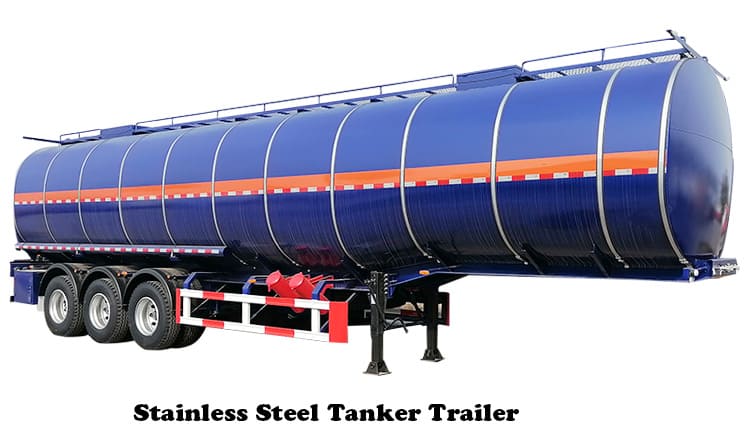
Stainless Steel tanker trailer for Sale in Senegal
Aluminum steel combines lightweight characteristics with strength, making it an attractive option for fuel tanker truck trailers. The reduced weight of aluminum steel trailers can lead to improved fuel efficiency, allowing for more economical fuel distribution.
Aluminum is also highly resistant to corrosion, similar to stainless steel, which enhances the trailer's lifespan and safety. However, aluminum trailers can be more susceptible to structural damage due to its softer nature compared to steel materials. Despite this, proper engineering and design can mitigate these risks.
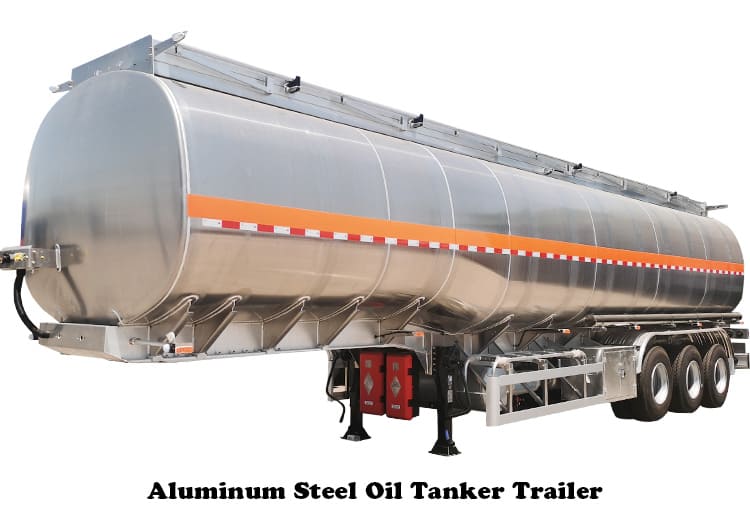
Aluminum steel tanker trailer for Sale in Senegal
In Senegal, where the efficient distribution of fuel is crucial for the nation's growth and development, the choice of material for fuel tanker truck trailers plays a significant role. Whether it's carbon steel, stainless steel, or aluminum steel, each material offers a unique set of advantages and considerations.
Companies operating in the fuel transportation industry must carefully evaluate their priorities, such as budget, durability, corrosion resistance, and environmental impact, to determine the most suitable material for their fleet of trailers. Ultimately, the right choice of material ensures that fuel reaches its destinations safely, efficiently, and responsibly, contributing to the continued progress of Senegal's economy and society.
Driving a fuel tanker trailer in Senegal demands a unique set of skills, caution, and adherence to safety protocols. Transporting one of the most critical resources - fuel - requires drivers to be vigilant, knowledgeable, and prepared for the challenges posed by varying road conditions, traffic, and environmental factors. Whether you're a seasoned driver or a newcomer to the profession, here's a guide on how to safely and skillfully drive a fuel tanker trailer in Senegal.
1. Comprehensive Training and Certification
Before even getting behind the wheel of a fuel tanker trailer, drivers in Senegal must undergo rigorous training and obtain the necessary certifications. These training programs cover the intricacies of handling hazardous materials, emergency procedures, safe driving practices, and equipment operation. Government regulations mandate that all drivers transporting fuel have the appropriate endorsements on their commercial driver's licenses, indicating their proficiency in handling hazardous materials.
2. Familiarity with Regulations
Drivers of fuel tanker trailers must be well-versed in both general road regulations and specific regulations governing the transportation of hazardous materials. These regulations include speed limits, weight restrictions, proper signage, and emergency response protocols. Staying up-to-date with any changes in regulations is crucial to ensuring compliance and safety on the road.
3. Pre-Trip Inspections
Before embarking on a journey, drivers must conduct thorough pre-trip inspections of their fuel tanker trailers. This includes checking for any signs of leaks, inspecting valves and seals, ensuring proper tire pressure, and examining brakes and lights. These inspections are critical for identifying potential hazards and preventing accidents during transit.
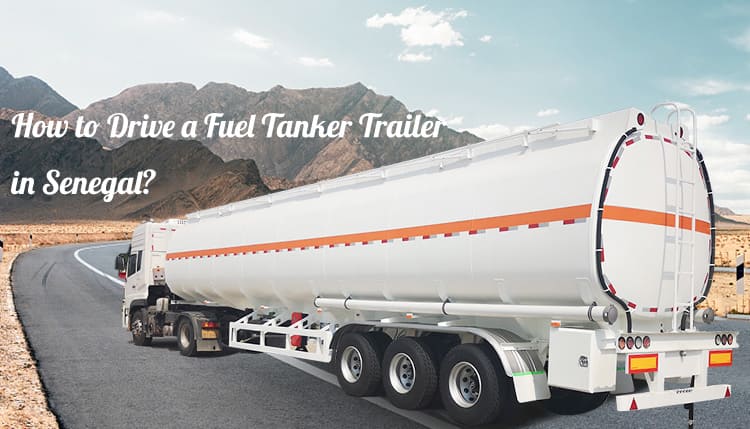
How to Drive a Fuel Tanker Trailer in Senegal
4. Load Securement
Ensuring that the cargo is properly secured within the tanker is essential to prevent sloshing or shifting during transportation. Improper load securement can lead to instability, which is especially dangerous when transporting flammable liquids. Drivers should also ensure that the vehicle's center of gravity is properly balanced to maintain stability on the road.
5. Defensive Driving
Driving defensively is a fundamental aspect of operating a fuel tanker trailer. Senegal's road conditions can vary, from well-paved highways to rugged rural routes. Drivers should maintain a safe following distance, anticipate potential hazards, and always prioritize the safety of themselves, other road users, and the cargo they're transporting.
6. Environmental Awareness
Environmental protection is paramount when transporting fuel. Drivers must be cautious not only about the potential for spills but also about preserving the environment during their operations. Avoiding sensitive ecological areas and being prepared with spill containment materials are crucial steps in minimizing the environmental impact of fuel transportation.
7. Emergency Preparedness
Being prepared for emergencies is essential when transporting hazardous materials. Drivers should be equipped with the knowledge of how to respond to leaks, fires, or other hazardous situations. Regularly reviewing emergency response procedures and having the necessary safety equipment on hand is imperative.
8. Continuous Training and Improvement
Driving a fuel tanker trailer is an ongoing learning experience. Staying informed about the latest industry trends, safety practices, and technological advancements is essential for continuous improvement and maintaining a high level of competence.
Driving a fuel tanker trailer in Senegal requires a unique blend of skill, caution, and commitment to safety. The responsibility of transporting flammable liquids demands a heightened sense of awareness and preparedness from every driver. By adhering to training, regulations, safety protocols, and best practices, fuel tanker drivers contribute to the safe, efficient, and reliable distribution of this vital resource throughout the country.